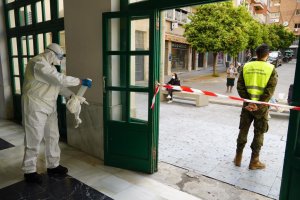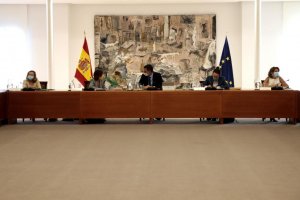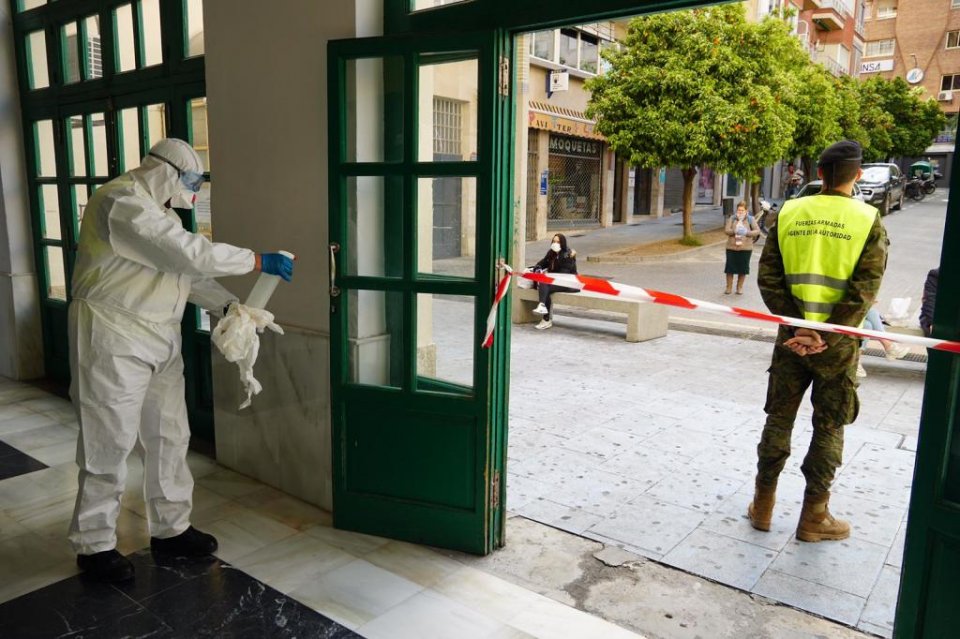Latest: Coronavirus in Spain figures (14 Sept)
Please support Spain in English with a donation
Click here to get your business activity or services listed on our DIRECTORY
Report below updated in Spain at 17.45h on Tuesday 25 August
CORONAVIRUS in SPAIN – latest Health Ministry figures
The latest official figure* released by the Spanish Health Ministry on Tuesday 25 August for the number of people who have tested positive for Coronavirus (Covid-19) is now 412,553. This is an overall increase of 7,117 against the figure released on Monday – with the ministry stating that 2,415 of these infections have occurred in the past 24 hours.
Figures released today show that 1,403 people have required hospital treatment in the past 7 days, with 87 in intensive care.
The ministry is still verifying and updating historical data (please also see discrepancies in figures* below). It has also not been updating any figures during the weekends since Friday 3 July.
Figures on Monday had shown an overall increase of 19,382 infections against Friday’s figures – with the ministry stating that 2,060 had occurred in a 24 hour period.
Friday had seen an overall increase of 8,148 infections against Thursday – yet 3,650 in a 24 hour period.
When Spain imposed its ‘state of alarm’ from Saturday 14 March, the Health Ministry had confirmed 4,231 known cases of Coronavirus at the time (based on figures released on Friday 13 March), with 121 deaths from it. By Monday 16 March, there had been a further 4,960 confirmed infections, taking the total at the time to 9,191. The death toll on 16 March had increased to 309.
Of the 2,415 new infections registered in the past 24 hours by the central Health Ministry in Spain on Tuesday 25 August, the numbers per region are as follows:
- 768 in Madrid (25,661 new cases in past 14 days)
- 257 in Andalusia (7,163)
- 225 in the Basque Country (6,603)
- 216 in the Canary Islands (2,178)
- 159 in Aragón (5,499)
- 153 in Catalonia (12,593)
- 113 in Galicia (2,376)
- 92 in Navarra (1,455)
- 78 in Castilla y León (3,873)
- 67 in the Valencia Region (4,474)
- 64 in La Rioja (813)
- 53 in Asturias (385)
- 51 in Cantabria (810)
- 50 in Castilla La Mancha (2,494)
- 38 in Extremadura (841)
- 10 in the Balearic Islands (2,600)
- 1 in Murcia (1,444)
- 11 in Melilla (99)
- 9 in Ceuta (62)
The current peak of recorded infections for a 24-hour period in Spain was on 31 March, when 9,222 new cases were registered.
Coronavirus-related deaths
The Ministry of Health’s official figures* for the total number of Coronavirus-related deaths on Tuesday 25 August is now 28,924 – an increase of 52 since Monday’s figures (yet according to the ministry, it is a total of 116 deaths in the past 7 days).
The current known peak of recorded deaths related to Coronavirus in a 24-hour period in Spain was on 2 April, when 950 deaths were registered.
A full breakdown of the data per region, together with age group statistics can be found by clicking here.

PM Pedro Sánchez offers 2,000 troops and ‘regional state of alarms’
Following a cabinet meeting on Tuesday, Spanish Prime Minister Pedro Sánchez announced the possibility of ‘regional state of alarms’ in Spain for those regions that require it in order to combat the spread of Coronavirus – as well as 2,000 troops to assist with tracking and tracing.
Read our full report here: Pedro Sánchez offers possibility of ‘regional state of alarms’ – plus 2,000 troops to assist tracking Covid-19
Spain has carried out 5.8m PCR tests since start of pandemic
The regional governments of Spain have notified the central Ministry of Health that a total of 5,849,939 PCR diagnostic tests have been performed up to 20 August.
Specifically, between 14-20 August, the regional governments have increased their capacity to carry out PCR testing by 9% – and the PCR rate to date has increased to 124.2 tests per 1,000 inhabitants.
Together with the PCR tests performed, the regional governments have also reported that a total of 2,205,074 rapid antibody tests have been carried out, at a rate of 46.82 tests per 1,000 inhabitants, and a rise of 2% on the number the previous week.
This means that 462,433 antibody blood tests have been carried out, at a rate of 9.82 per 1,000 inhabitants, representing an increase of 8%.
In total, 8,517,446 tests (PCR and antibody) for Covid-19 have been carried out since the start of the epidemic, of which 557,549 correspond to the week from 14-20 August.

Spain imposes strict new measures on nightlife
On Friday 14 August Spain’s Health Minister Salvador Illa announced strict new measures on nightlife across the whole country – as well as a ban on smoking outside, where social distancing cannot be maintained – in a further attempt to stop the spread of Coronavirus (Covid-19). Each region of Spain is imposing the restrictions following their own timetable.
These are the key measures:
- Music bars, nightclubs and discos will be closed across Spain.
- All other bars and restaurants to close at 1am, with last customers allowed by midnight.
- Following the measures already taken in Galicia and the Canary Islands, smoking will also be prohibited outside if 2 metre social distancing cannot be maintained.
- There should be 10 people maximum at tables.
- No ‘botellones’ (street drinking parties) allowed.
Read the full report here: Spain imposes strict new measures on nightlife across the country
ALSO READ: Catalonia bans social gatherings of more than 10 people
*Discrepancies in figures
Although the Health Ministry updated its official Coronavirus mortality figures on 19 June following on-going discrepancies with the data released by some of the country’s regional health authorities – there are still huge differences in the ‘excess mortality’ figures published for this period in Spain.
Click here for full report: Spain’s ‘excess mortality’ during Coronavirus pandemic is over 43,000
Spain’s National Statistics Institute (INE) published figures showing that the number of deaths for the first 21 weeks of 2020 have been 24% higher than for the same period in 2019 – based on information received from the country’s civil registries (1 January to 24 May). The number of deaths during this period for 2020 is 43,945 higher than in 2019.
Spain – ‘New Normality’
After three months under a ‘state of alarm’ (since 14 March), Spain entered its ‘New Normality’ phase on Monday 22 June, following on from the government’s four phased plan to relax the country’s lockdown restrictions. CLICK HERE for all details: Spain’s ‘New Normality’ – key points
Sign up for the FREE Weekly Newsletter from Spain in English
Please support Spain in English with a donation.
Click here to get your business activity or services listed on our DIRECTORY
Click here for all previous reports on: Coronavirus in Spain
ALSO READ: Catalonia bans social gatherings of more than 10 people
ALSO READ: Catalonia and Castilla La Mancha order the closure of brothels
ALSO READ: Backlash in Valencia against nightlife curfews – plus support for tourism
ALSO READ: Authorities warn of fines following anti-face mask protest in Madrid
ALSO READ: Coronavirus in Spain figures (21 August)
ALSO READ: ‘Things are not going well,’ admits Health Ministry (20 August)
ALSO READ: Spain imposes strict new measures on nightlife across the country
ALSO READ: Spain’s GDP fell by 18.5% in second quarter, due to Covid-19 lockdown
ALSO READ: UK-Spain tourism fall-out continues: ‘Many British tourists feel safer in Benidorm than at home’
ALSO READ: Madrid makes face masks compulsory – and imposes nightlife restrictions
ALSO READ: Catalonia to impose fines of up to €15,000 for ‘botellones’ – street drinking parties
ALSO READ: Germany advises against travelling to Catalonia, Aragón and Navarra
ALSO READ: Pedro Sánchez: ‘Safer to be in most regions of Spain than in the UK’
ALSO READ: Spain insists it is ‘a safe country’ for tourism – but cancellations continue
ALSO READ: UK advises against travelling to Spain – and imposes quarantine on return
ALSO READ: Catalonia closes nightclubs and imposes other curfews
ALSO READ: France urges citizens not to travel to Catalonia [in 24 July report]
ALSO READ: EU leaders conclude marathon summit with ‘historic’ rescue package
ALSO READ: Spain honours Coronavirus victims as outbreaks continue
ALSO READ: Face masks to be compulsory in Catalonia – even with social distancing
ALSO READ: Spain’s ‘New Normality’ – key points
ALSO READ: ‘New Normality’ decree approved as Health Minister warns ‘danger is still here’
ALSO READ: Face masks to remain compulsory until vaccine found, under ‘new normality’
ALSO READ: Lifting of lockdown in Spain – full details of all phases for all regions
Sign up for the FREE Weekly Newsletter from Spain in English
Please support Spain in English with a donation.
Click here to get your business activity or services listed on our DIRECTORY


